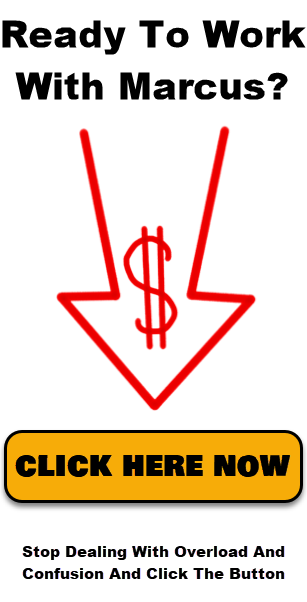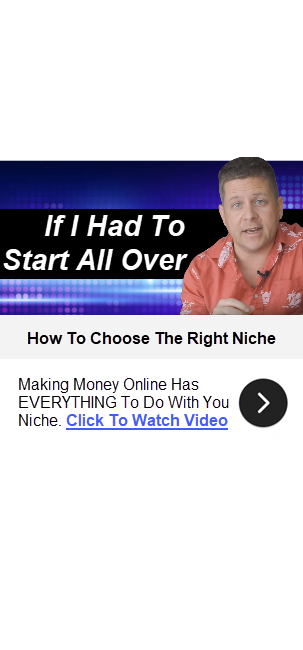Entrepreneur Mindset Hacks Part One
Part One: How To Be An Entrepreneur – Thinking Differently
How to Think Like an Entrepreneur
So You can See Outside the BS
And Use What Really Works
(Once you see this, you can’t unsee it.)
Sometimes it’s good to just get out of your comfort zone and do something.
I remember the first time I did a webinar. I had never done them before. I once did a tele-seminar. After that, one guy said to me, “Hey dude, just hop on this webinar.” I was all nervous and shaky (which is funny, because I was really just sitting in my office talking to the wall, and there just happened to be people that could see through the wall.)
And in the end, it really wasn’t that big a deal.
And I think that’s what we can learn here. You’re going to learn that being an entrepreneur is not that big a deal. What takes someone from $1,000 a year to $1 million per year, is not that big a deal.
I remember the first time I met a guy who was making a million dollars a year with web marketing. He said, “I’ll call you back later. My wide needs to go to Target.”
I was sitting there amazed. I thought, people making a million dollars a year still go to Target? That was so weird in my mind. I thought, how does that work? Do these people have a different life?
I think in society, we’re programmed to think that successful people have a different life. It’s something big, and different, and crazy, and weird. When in actuality, it’s really not.
There’s no difference between me and you. (Except that I’m probably about a foot shorter than everyone here. And I probably smoke too many pipes. That’s really it.)
You go to work eight hours a day, I go to work eight hours a day. The only difference is what we’re doing, and who we’re doing it for.
I’ll bet some of you guys work harder than me. Some of you guys work manual labor, some of you guys are drivers. And if you’ve ever seen me drive, you don’t want me to be a driver.
But there’s really no difference here. We’re going to go over that, and we’ll talk about what it really takes to be an entrepreneur. How to focus on it, and how to really get into the mindset.
And I’m going to tell you, it’s probably not what you think it’s going to be.
I have a different view on life, and on entrepreneurship, from a lot of my peers in the industry. And I think it comes from my years of experiences.
For one thing, I love to study people. I love to learn about what people do, what makes people tick, and I like to really learn about what it is that makes someone successful. What is it that makes someone sad? What is it that makes someone happy? And different things like that.
We’re going to talk about those things, too.
So, what does it really take to be an entrepreneur? Here are some tips that you must understand in order to master the entrepreneurial mindset.
Tip #1: Everything is made-up preprogramming.
No matter where you’re at, no matter what you’re doing. Even if you’re not in a cult, or you don’t follow mainstream media. You are a product of programming. You’re programmed by your upbringing, by your TV, by social interaction.
We all have the BS that has been programmed in our mind.
It says:
Be a worker.
Work for someone else.
Have the security.
That’s what life’s about. And we’re taught that from the time we’re a kid. We’re taught to really, really value the input of others. Really, really listen to what other people say.
If someone says something that hurts, you, you’re supposed to be hurt. If someone says something that praises you, you’re allowed to feel praised.
The funny thing is, you have those feelings inside you, right?
So, think about that. Ask yourself, “What is my current programming telling me? What is my current mindset telling me?”
Let’s look at this in terms of money. If you’re not getting the results you want, it might be as simple as going and following a few instructions. There may just be a lot more going on in your mind. Why is that?
I remember, I struggled for years. I used to always tell myself, “Why don’t I know what I should do? I know I could get to two, three million dollars a year. I know I could break this barrier. Why is it that I’m not doing what I know I need to do? It’s not like it’s that hard. It’s not like it’s strenuous. It’s not like I can’t afford it.”
In the end, it didn’t even take that much money. I started this business with a hundred dollars.
You might be asking yourself, “Why am I not doing that? Why am I not doing what I know I need to do?”
How many of you feel that way? You now you could go out there and do it, but for some reason, you just can’t get yourself to do it. You might not believe it’s actually going to work.
Or you might be afraid that it actually will work, and when you actually make money, you’ll lose the ability to have excuses.
I have students who watch thousands of hours of my webinars, and they still don’t take action. That’s fine. I mean, I’m glad they get value, or entertainment or whatever. But still, I have to ask, “Why are you not taking action? Why are you not doing something?”
Because you’ve been programmed not to do anything.
But the cool thing about a programmed mind is that it can always be unprogrammed.
You can always reverse what was done. You can always look through it. But the only way you’re going to look through it is by rising about it.
You might ask yourself, “How do I rise above this?
How do I look from the outside in?”
You have to realize that the confidence, or the belief in yourself, is not in the other people who say it to you. It’s in you because you believe it. You just choose to believe it from other people.
It’s the same kind of thing if someone puts you down, or says things won’t work, or says you’re not good enough, or smart enough, or whatever it may be. That’s in you. You have those feelings in you, you’re just choosing to say, “Yes, I agree with this person.”
So, realize that everything is made up from programming. You’re programmed to believe, and be, and think what you are right now.
I have this saying in my own life that has helped me immensely.
It goes, “If I were in your shoes, I’d be exactly where you are.”
If I had your upbringing, if I had the programming you had, if I had the parents you had, if I had the social area that you grew up in, if I had all those things, I would be exactly where you’re at right now.
That’s the way that it works. If you take someone and put them through circumstances, they’re going to be the product of those circumstances.
Now, you have a way to see out of it, but sometimes you need some help. That’s what this is about.
Now that you know that you’re a product of all of this…
Now that you know that society has put these things in your mind…
Now that you know that lots of people have paid a lot of money for you to have the mindset that you have…
What are you going to do about it? It’s time to understand it, and to change it.
Everything is made up of pre-programming. Your mind, what you think, is not as good as you think it is. Often, we respond to ideas before really trying them out. We make this preplanned idea of what is going to work, what isn’t going to work, and what one person will think, and what another person won’t think.
We’re always filtering. Now, filtering is good because it makes life faster. But it can also be bad, because it means you’re not really listening to something, right?
In the core of your mind, you’re never actually learning new things.
Your brain is looking to fit new information into old categories. That’s the way the mind works. It’s called categorical reference.
This can be a good thing, but it can also be bad, in that you can’t really learn new stuff unless you think outside the box.
Realize that you are in charge of the information you put in your brain. You’re in charge. Right now, you decide.
Tip #2: Money is not an emotional thing.
This is a big one. Money is not an emotional thing. Money doesn’t give a shit about you. It doesn’t care when you don’t have enough of it. It doesn’t think, it doesn’t feel. It’s just a unit of measurement.
A lot of times in life we’ve been programmed to think that money is this big thing.
Think about the United States and the national debt.
What would happen in the United States if the national debt was completely paid off? If the national debt was paid off, would we all have a bunch of money? Would the government give us a bunch of free stuff?
It’s not what you think—it’s actually worse than you think. It would probably be closer to economic collapse.
That’s because the nature of money is debt. That’s how it’s created.
The government puts a certain amount of money in circulation, and that’s a negative called the national debt. Contrary to what most people think, it’s not all owed to China and other countries. It’s pretty much owed to ourselves.
But TV and programming all say that the national debt is terrible. We’re pre-programmed to think that way. We think it’s terrible to have all this debt, but all the while, it’s actually kind of meaningless.
Now, does that mean we should go out of control and spend a lot? No, that causes inflation. We have to balance it, which is why you need regulations and things like that. Basically, money works a lot differently than we think it does.
A lot of people get emotional about money. They feel funny about it. They think, “oh man, I don’t have enough.”
How many of you right now are sad that you don’t have enough money? You feel bad for yourself?
A lot of people are sad, happy, or depressed about money. People say, “I wish I had more money.” Some people even hate money.
But money’s not really anything to hate. It’s just a number. It’s weird. In life we look at people who have a lot of money, and we think about them differently. We idolize celebrities.
But money itself is not an emotional thing. It doesn’t care.
Never did a dollar build anything.
Never did a dollar jump out of my wallet and say, I love you.
Never did a dollar jump out of my wallet and say, I want you to be happy.
Money is just a unit of measurement. It’s like a ruler. Money is a manmade invention. We believe that the money is going to run out. We think there’s not enough, that it’s a limited supply. But it’s not a limited supply. There’s plenty to go around.
You have to look at it and realize that money is not emotional, and therefore, you’re not going to be emotionally attached to money.

